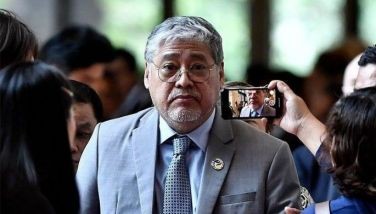US experts tapped in efforts to professionalize PNP
May 29, 2006 | 12:00am
The National Police Commission (Napolcom) has tapped experts from a top United States-based university and the country’s leading educational institutions to draw up the qualifying career examinations for third-level officers of the Philippine National Police (PNP) as part of efforts to further professionalize the police force.
Interior Secretary Ronaldo Puno, concurrent Napolcom chairman, said third-level officers — with the ranks of senior superintendent to director general - will have to undergo rigorous interviews and evaluations by their peers, subordinates and superiors on top of hurdling the Police Executive Service Eligibility (PESE) examination before being considered for promotion.
"Stepped-up efforts are underway to ensure that only qualified PNP personnel who have undergone a thorough assessment and evaluation are considered for promotions," Puno said.
"Given that the CSC (Civil Service Commission) has ruled that the PNP is a closed-career system, the Napolcom has developed its own set of eligibility exams with the help of experts to help maintain the high qualification standards in our police organization," he added.
A total of 42,764 examinees took the Napolcom-administered entrance and promotional examinations for PNP personnel yesterday in designated schools and testing centers nationwide. Should an applicant pass the entrance exam, he or she will be given the rank of Police Officer 1. The promotional exams were given to PNP personnel wishing to be promoted one rank higher to police officer 2 and 3; senior police officer (for SPO1 to SPO4); police inspector (for inspector and senior inspector); and police superintendent (for chief inspector and superintendent).
Napolcom director for personnel and administrative services Bernardo Calibo said academic experts from the Fordham University of New York, the University of the Philippines, De La Salle University, Ateneo de Manila University and Assumption College are helping Napolcom draw up the qualifying exams for third-level police officers on the topics covered by police services, tactics, operations, police administration and management.
"Considering that police officers have to develop skills different from those covered by the Career Service Executive Eligibility (CSEE) examinations administered by the CSC, the Napolcom has developed the PESE exclusively for the PNP," Puno said.
However, he said officers who have already taken the CSEE instead of the PESE will still be considered and their career service executive eligibility will be attached to their recommendations for promotion.
Calibo said the Supreme Court has ruled that the authority to grant promotional and eligibility exams to PNP personnel rests with the Napolcom, and he pointed out that Article 16, Section 6 of the Constitution states that the CSC shall exercise supervision and control of the PNP.
He also noted that in a memorandum circular issued by the CSC en banc in 1994, when now Labor Secretary Patricia Sto. Tomas was at its helm, the commission had already classified the PNP as a "closed-career" system, which means that it is outside the coverage of the CSC. A ruling issued by the CSC en banc cannot be overturned even by its chairman, Calibo said.
Meanwhile, Napolcom vice chairwoman and executive officer Imelda Roces said the CSC’s closed circuit television system, which is in its trial period, was used to preserve the integrity and reliability of the police exams by monitoring the preparation of test materials.
She said the surveillance technology will also help Napolcom in its time-motion study to see if it can reduce the number of days the members of the exam team are put in quarantine to save on examination costs.
"The Napolcom has been very judicious in deciding on this matter because we also had to consider the morale of our employees," Roces said. "However, we had to place security and transparency above everything else."
The surveillance camera will also be installed in other Napolcom office areas with sensitive functions — the Electronics Data Processing Services Division under the Planning and Research Service and the Financial Service, because these offices handle, respectively, the release of the examination results and police benefits.
Interior Secretary Ronaldo Puno, concurrent Napolcom chairman, said third-level officers — with the ranks of senior superintendent to director general - will have to undergo rigorous interviews and evaluations by their peers, subordinates and superiors on top of hurdling the Police Executive Service Eligibility (PESE) examination before being considered for promotion.
"Stepped-up efforts are underway to ensure that only qualified PNP personnel who have undergone a thorough assessment and evaluation are considered for promotions," Puno said.
"Given that the CSC (Civil Service Commission) has ruled that the PNP is a closed-career system, the Napolcom has developed its own set of eligibility exams with the help of experts to help maintain the high qualification standards in our police organization," he added.
A total of 42,764 examinees took the Napolcom-administered entrance and promotional examinations for PNP personnel yesterday in designated schools and testing centers nationwide. Should an applicant pass the entrance exam, he or she will be given the rank of Police Officer 1. The promotional exams were given to PNP personnel wishing to be promoted one rank higher to police officer 2 and 3; senior police officer (for SPO1 to SPO4); police inspector (for inspector and senior inspector); and police superintendent (for chief inspector and superintendent).
Napolcom director for personnel and administrative services Bernardo Calibo said academic experts from the Fordham University of New York, the University of the Philippines, De La Salle University, Ateneo de Manila University and Assumption College are helping Napolcom draw up the qualifying exams for third-level police officers on the topics covered by police services, tactics, operations, police administration and management.
"Considering that police officers have to develop skills different from those covered by the Career Service Executive Eligibility (CSEE) examinations administered by the CSC, the Napolcom has developed the PESE exclusively for the PNP," Puno said.
However, he said officers who have already taken the CSEE instead of the PESE will still be considered and their career service executive eligibility will be attached to their recommendations for promotion.
Calibo said the Supreme Court has ruled that the authority to grant promotional and eligibility exams to PNP personnel rests with the Napolcom, and he pointed out that Article 16, Section 6 of the Constitution states that the CSC shall exercise supervision and control of the PNP.
He also noted that in a memorandum circular issued by the CSC en banc in 1994, when now Labor Secretary Patricia Sto. Tomas was at its helm, the commission had already classified the PNP as a "closed-career" system, which means that it is outside the coverage of the CSC. A ruling issued by the CSC en banc cannot be overturned even by its chairman, Calibo said.
Meanwhile, Napolcom vice chairwoman and executive officer Imelda Roces said the CSC’s closed circuit television system, which is in its trial period, was used to preserve the integrity and reliability of the police exams by monitoring the preparation of test materials.
She said the surveillance technology will also help Napolcom in its time-motion study to see if it can reduce the number of days the members of the exam team are put in quarantine to save on examination costs.
"The Napolcom has been very judicious in deciding on this matter because we also had to consider the morale of our employees," Roces said. "However, we had to place security and transparency above everything else."
The surveillance camera will also be installed in other Napolcom office areas with sensitive functions — the Electronics Data Processing Services Division under the Planning and Research Service and the Financial Service, because these offices handle, respectively, the release of the examination results and police benefits.
BrandSpace Articles
<
>
- Latest
- Trending
Trending
Latest
Trending
Latest
Recommended




























